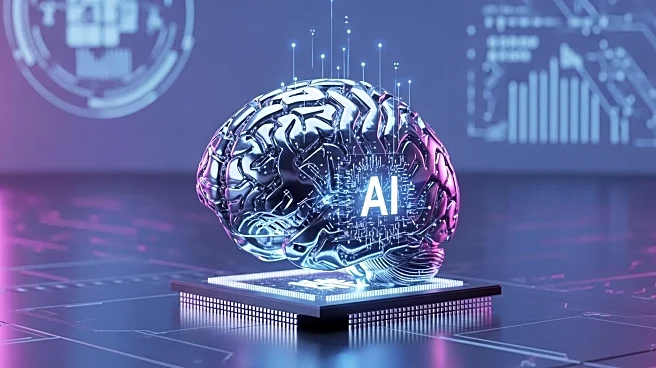What's Happening?
Tesla, led by Elon Musk, has transitioned its AI strategy from the Dojo supercomputer to a new AI training supercluster named Cortex. Originally, Dojo was intended to enhance Tesla's Full Self-Driving (FSD) capabilities by processing large volumes of video training data. Despite initial expectations that Dojo would revolutionize AI training with Tesla's custom D1 chips, the project encountered challenges and was eventually surpassed by the development of Cortex. Now operational at Tesla's Austin headquarters, Cortex employs approximately 50,000 Nvidia GPUs to support the latest version of FSD, offering significant improvements in safety and performance. This strategic shift aligns with Tesla's broader AI goals, including the development of the AI6 chip in collaboration with Samsung, aimed at advancing FSD and Tesla's Optimus humanoid robots.
Why It's Important?
The transition from Dojo to Cortex represents a significant strategic pivot for Tesla, consolidating its AI efforts into a unified path. This move is crucial for Tesla's ambitions in autonomous driving and robotics, as it seeks to enhance the safety and performance of its Full Self-Driving technology. By leveraging Nvidia GPUs and collaborating with Samsung on the AI6 chip, Tesla is positioning itself at the forefront of AI innovation in the automotive industry. This development could have substantial implications for the future of autonomous vehicles, potentially influencing industry standards and consumer expectations. Stakeholders in the automotive and tech sectors are likely to closely monitor Tesla's progress, as successful implementation could lead to competitive advantages and drive further advancements in AI technology.
What's Next?
Tesla's focus on Cortex and the AI6 chip suggests continued investment in AI infrastructure and capabilities. As Cortex becomes fully operational, Tesla may further refine its FSD technology, potentially leading to new features and enhancements in its vehicles. The collaboration with Samsung on the AI6 chip indicates ongoing efforts to improve processing power and efficiency, which could accelerate the development of Tesla's Optimus humanoid robots. Industry observers and competitors will likely watch Tesla's advancements closely, as they could set new benchmarks for AI applications in transportation and robotics. Future announcements from Tesla regarding AI developments and partnerships may provide additional insights into its strategic direction.
Beyond the Headlines
Tesla's shift from Dojo to Cortex highlights the dynamic nature of AI development and the challenges associated with pioneering new technologies. The discontinuation of Dojo underscores the importance of adaptability and strategic realignment in the face of technical obstacles. This transition may also reflect broader trends in the tech industry, where companies must continuously innovate to maintain competitive edges. Ethical considerations surrounding AI, such as safety and privacy, remain pertinent as Tesla advances its autonomous driving capabilities. The integration of AI into everyday life, through vehicles and robots, raises questions about societal impacts and regulatory frameworks that may need to evolve in response to these technological shifts.









